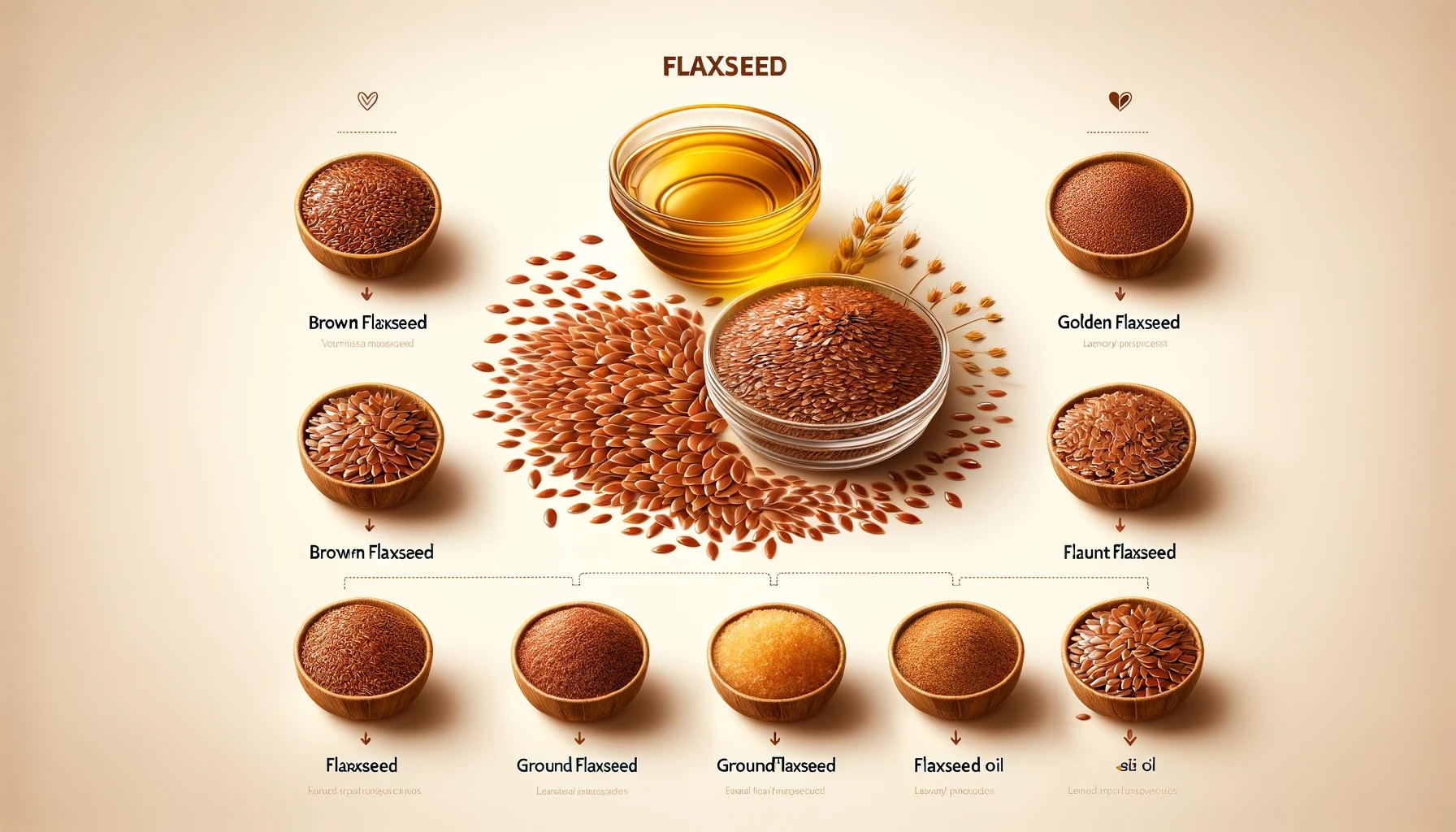History of Flaxseed
Flaxseed, also known as linseed, has been cultivated since ancient times. It was first domesticated in the Fertile Crescent and has been valued for its health benefits and versatility in both food and textiles.


Varieties of Flaxseed
Flaxseed is available in two main varieties: brown and golden. Both types are highly nutritious, though there are slight differences in taste and nutrient content.

Preparation of Flaxseed
Flaxseed can be consumed in various forms, including whole seeds, ground flaxseed, and flaxseed oil. Grinding flaxseed enhances its digestibility and nutrient absorption.

Flaxseed Smoothie
Blend ground flaxseed with banana, berries, spinach, and almond milk for a nutritious and delicious smoothie.
Health Pros: High in omega-3 fatty acids, fiber, and antioxidants. Helps reduce inflammation and supports heart health.
Health Cons: Excessive consumption may cause digestive discomfort.
Flaxseed Pudding
Mix ground flaxseed with almond milk, vanilla extract, and a sweetener of your choice. Let it sit overnight to thicken.
Health Pros: High in fiber, which aids digestion and promotes a feeling of fullness.
Health Cons: Needs to be consumed with plenty of fluids to avoid constipation.
Flaxseed Bread
Incorporate ground flaxseed into your bread dough for an added nutritional boost.
Health Pros: Adds essential fatty acids and fiber to your diet.
Health Cons: May alter the texture of traditional bread, making it denser.
Nutritional Values of Flaxseed
Flaxseed is rich in omega-3 fatty acids, lignans, and fiber. It provides a significant amount of protein and various essential minerals such as magnesium, phosphorus, and copper.
Regular consumption of flaxseed can help lower cholesterol levels, improve digestive health, and reduce the risk of chronic diseases.
Nutrition Facts
Serving Size 2 Tbsp (14g)
Servings Per Container: Varied
Amount Per Serving
Calories 70
% Daily Value*
Total Fat 4.5g 6%
Saturated Fat 0.4g 2%
Trans Fat 0g
Polyunsaturated Fat 3g
Monounsaturated Fat 0.8g
Cholesterol 0mg 0%
Sodium 5mg 0%
Total Carbohydrate 4g 1%
Dietary Fiber 3g 11%
Total Sugars 0g
Protein 3g
Vitamin D 0mcg 0%
Calcium 26mg 2%
Iron 1mg 6%
Potassium 85mg 2%
* The % Daily Value (DV) tells you how much a nutrient in a serving of food contributes to a daily diet. 2,000 calories a day is used for general nutrition advice.
HealthScore: 95
For more detailed information and research on flaxseed nutrition, visit NutritionFacts.org.
Alternatives to Flaxseed
For those seeking other sources of plant-based omega-3 fatty acids, consider these alternatives.
Chia Seeds
Chia seeds are a great source of omega-3s, fiber, and protein. They can be used similarly to flaxseed in recipes.
Nutritional Values: High in fiber, omega-3s, and essential minerals.
Hemp Seeds
Hemp seeds are rich in protein, healthy fats, and a variety of nutrients. They have a mild, nutty flavor and can be added to many dishes.
Nutritional Values: Excellent source of protein, omega-3 and omega-6 fatty acids.
Walnuts
Walnuts are another good source of plant-based omega-3s. They are also high in antioxidants and support brain health.
Nutritional Values: High in omega-3s, antioxidants, and various vitamins and minerals.
External Recipes
Flaxseed Crackers
Ingredients: Ground flaxseed, water, garlic powder, onion powder, salt, pepper.
Nutritional Values: High in fiber and omega-3 fatty acids.
Flaxseed Muffins
Ingredients: Whole wheat flour, ground flaxseed, baking soda, cinnamon, salt, applesauce, honey, eggs, vanilla extract.
Nutritional Values: High in fiber, omega-3s, and essential vitamins and minerals.
Flaxseed Energy Balls
Ingredients: Ground flaxseed, oats, peanut butter, honey, chocolate chips, vanilla extract.
Nutritional Values: High in protein, healthy fats, and fiber.